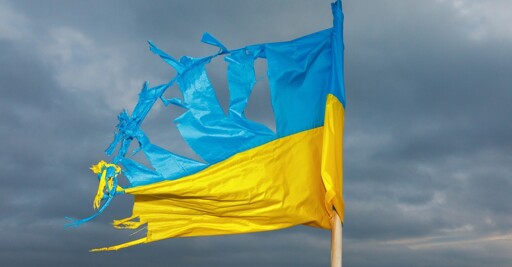Volodymyr Zelensky built a mythic reputation as a lonely bulwark against global tyranny. On Tuesday, the president of Ukraine signed that reputation away, enacting a law that gutted the independence of his country’s anti-corruption agencies just as they closed in on his closest political allies, reportedly including one of his longtime business partners and a former deputy prime minister. To justify the decision, he cloaked it in an invented conspiracy, insinuating that Russian moles had implanted themselves in the machinery of justice. This is a scoundrel’s playbook.
Despite the ongoing war, Ukrainians swamped the streets of Kyiv in protest of their president’s betrayal of democracy, forcing Zelensky to introduce new legislation reversing the bill he had just signed into law. It was a concession of error—and possibly an empty gesture, because the new bill is hardly a lock to pass the legislature. That Zelensky brazenly weakened Ukraine’s anti-corruption guardrails in the first place shouldn’t come as a shock. They were erected only under sustained pressure from the Obama administration as part of an explicit bargain: In exchange for military and financial support, Ukraine would rein in its oligarchs and reform its public institutions. Over time, the country drifted, however unevenly, toward a system that was more transparent, less captive to hidden hands.
But in the Trump era, the United States has grown proudly tolerant of global corruption. In fact, it actively encourages its proliferation. Beyond the president’s own venal example, this is deliberate policy. Brick by brick, Donald Trump has dismantled the apparatus that his predecessors built to constrain global kleptocracy, and leaders around the world have absorbed the fact that the pressure for open, democratic governance is off.
[Anne Applebaum: Kleptocracy, Inc.]
Three weeks into his current term, Trump paused enforcement of the Foreign Corrupt Practices Act—loudly declaring that the United States wasn’t going to police foreign bribery. Weeks later, America skipped a meeting of the Organization for Economic Cooperation and Development’s anti-bribery working group for the first time since its founding 30 years ago. As the head of the anti-corruption group Transparency International warned, Trump was sending “a dangerous signal that bribery is back on the table.”
For decades, the U.S.did more than prosecute bribery cases; it tried to cultivate civil-society organizations that helped emerging democracies combat corruption themselves. But upon returning to the presidency, Trump destroyed USAID, the National Endowment for Democracy, and the U.S. Institute of Peace, dismantling the constellation of government agencies that had quietly tutored investigative journalists, trained judges, and funded watchdogs.
These groups weren’t incidental casualties in DOGE’s seemingly scattershot demolition of the American state. Trump long loathed the Foreign Corrupt Practices Act, which he described as a “horrible law,” an animus stoked by the fact that some of his closest associates have been accused of murky dealings abroad. Crushing programs and organizations that fight kleptocracy meshed with the “America First” instincts of his base; the likes of Tucker Carlson and Steve Bannon abhor the export of liberal values to the world.
From the wreckage of these institutions, a Trump Doctrine has taken shape, one that uses American economic and political power to shield corrupt autocrats from accountability. Benjamin Netanyahu, on trial for bribery, fraud, and breach of trust, has been a prime beneficiary. Just as he was preparing to testify under oath, Trump denounced the prosecution as a “political witch hunt” and threatened to withhold U.S. aid if the trial moved forward. Given Israel’s reliance on American support, the threat had bite. Not long after Trump’s outburst, the court postponed Netanyahu’s testimony, citing national-security concerns.
Trump acts as if justice for strongmen is a moral imperative. No retaliatory measure is apparently off limits. To defend his populist ally in Brazil, Jair Bolsonaro, who faces charges related to an attempted coup, Trump revoked the visa of Alexandre de Moraes, the Supreme Court justice overseeing the case. Last month, Trump threatened to impose 50 percent tariffs on Brazilian steel, aluminum, and agricultural exports to punish the country for Bolsonaro’s prosecution.
This is hard-nosed realism, not just ideological kinship. To protect himself, Trump must defend the rights of populist kleptocrats everywhere. He must discredit the sort of prosecution that he might someday face. That requires recasting malfeasance as perfectly acceptable statesmanship.
[Listen: The kleptocracy club]
By stripping anti-corruption from the moral vocabulary of American foreign policy, Trump is reengineering the global order. He’s laying the foundation for a new world in which kleptocracy flourishes unfettered, because there’s no longer a superpower that, even rhetorically, aspires to purge the world of corruption. Of course, the United States has never pushed as hard as it could, and ill-gotten gains have been smuggled into its bank accounts, cloaked in shell companies. Still, oligarchs were forced to disguise their thievery, because there was at least the threat of legal consequence. In the world that Trump is building, there’s no need for disguise—corruption is a credential, not a liability.
Zelensky is evidence of the new paradigm. Although his initial campaign for president in 2019 was backed by an oligarch, he could never be confused for Bolsonaro or Netanyahu. He didn’t enrich himself by plundering the state. But now that Trump has given the world permission to turn away from the ideals of good governance, even the sainted Zelensky has seized the opportunity to protect the illicit profiteering of his friends and allies.
Yet there’s a legacy of the old system that Trump hasn’t wholly eliminated: the institutions and civil societies that the United States spent a generation helping build. In Ukraine, those organizations and activists have refused to accept a retreat into oligarchy, and they might still preserve their governmental guardians against corruption. For now, they are all that remain between the world and a new golden age of impunity.
From The Atlantic via this RSS feed


